高中英语省略句及练习
- 格式:doc
- 大小:84.00 KB
- 文档页数:22
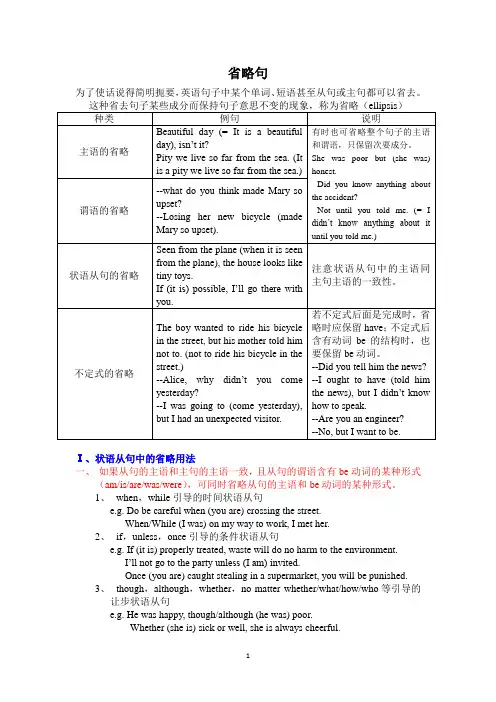
省略句为了使话说得简明扼要,英语句子中某个单词、短语甚至从句或主句都可以省去。
Ⅰ、状语从句中的省略用法一、如果从句的主语和主句的主语一致,且从句的谓语含有be动词的某种形式(am/is/are/was/were),可同时省略从句的主语和be动词的某种形式。
1、when,while引导的时间状语从句e.g. Do be careful when (you are) crossing the street.When/While (I was) on my way to work, I met her.2、if,unless,once引导的条件状语从句e.g. If (it is) properly treated, waste will do no harm to the environment.I’ll not go to the party unless (I am) invited.Once (you are) caught stealing in a supermarket, you will be punished.3、though,although,whether,no matter whether/what/how/who等引导的让步状语从句e.g. He was happy, though/although (he was) poor.Whether (she is) sick or well, she is always cheerful.No matter how/However hard the task (is), we must fulfill it in time.(注:从句的主语和主句的主语不一致时,只省略从句中的be动词形式)4、as if,as though引导的方式状语从句e.g. He rubbed his eyes and yawned as if/though (he was) waking up after along sleep.He stood up as if/though (he wanted) to leave.(as if/though + to do表示一个将来的动作)二、than,as引导的比较状语从句中的省略用法:当不同的主语进行比较时,一般省略从句中的谓语;当从句中的主语与谓语(be动词除外)和主句中的主语与谓语相同时,通常省略从句中的主语和谓语,只保留比较部分。
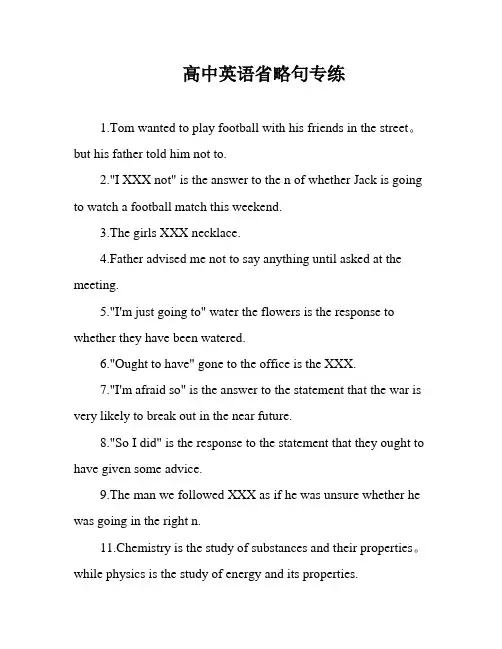
高中英语省略句专练1.Tom wanted to play football with his friends in the street。
but his father told him not to.2."I XXX not" is the answer to the n of whether Jack is going to watch a football match this weekend.3.The girls XXX necklace.4.Father advised me not to say anything until asked at the meeting.5."I'm just going to" water the flowers is the response to whether they have been watered.6."Ought to have" gone to the office is the XXX.7."I'm afraid so" is the answer to the statement that the war is very likely to break out in the near future.8."So I did" is the response to the statement that they ought to have given some advice.9.The man we followed XXX as if he was unsure whether he was going in the right n.11.Chemistry is the study of substances and their properties。
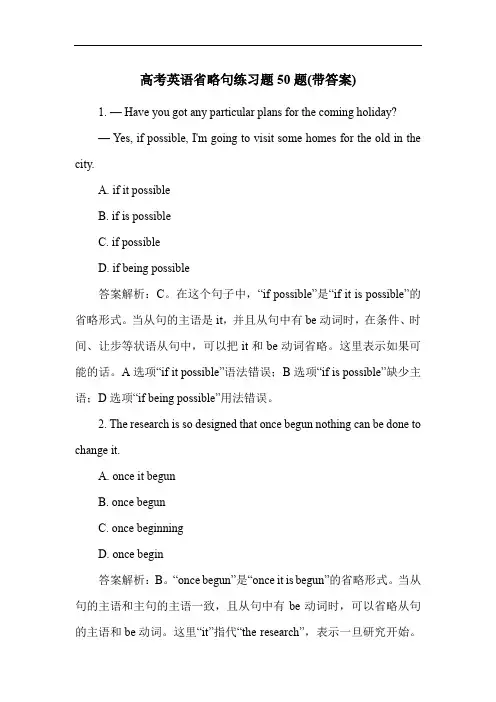
高考英语省略句练习题50题(带答案)1. — Have you got any particular plans for the coming holiday?— Yes, if possible, I'm going to visit some homes for the old in the city.A. if it possibleB. if is possibleC. if possibleD. if being possible答案解析:C。
在这个句子中,“if possible”是“if it is possible”的省略形式。
当从句的主语是it,并且从句中有be动词时,在条件、时间、让步等状语从句中,可以把it和be动词省略。
这里表示如果可能的话。
A选项“if it possible”语法错误;B选项“if is possible”缺少主语;D选项“if being possible”用法错误。
2. The research is so designed that once begun nothing can be done to change it.A. once it begunB. once begunC. once beginningD. once begin答案解析:B。
“once begun”是“once it is begun”的省略形式。
当从句的主语和主句的主语一致,且从句中有be动词时,可以省略从句的主语和be动词。
这里“it”指代“the research”,表示一旦研究开始。
A选项“once it begun”语法错误;C选项“once beginning”不符合这种省略规则;D选项“once begin”语法错误。
3. While in Paris, he picked up some French.A. While he was in ParisB. While was in ParisC. While in the ParisD. While he in Paris答案解析:A。
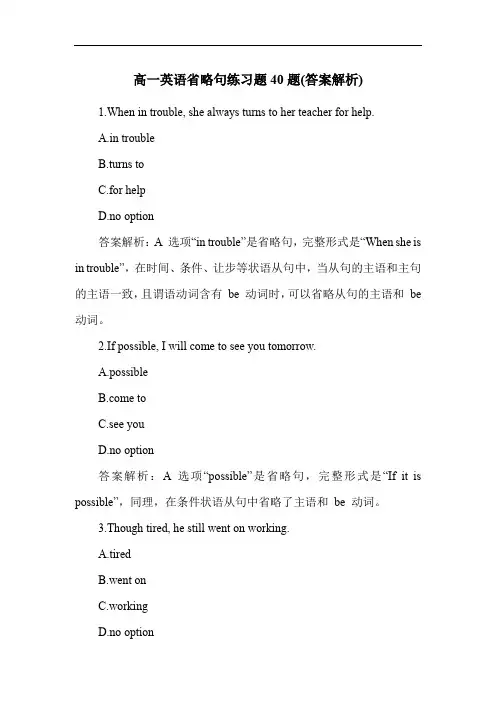
高一英语省略句练习题40题(答案解析)1.When in trouble, she always turns to her teacher for help.A.in troubleB.turns toC.for helpD.no option答案解析:A 选项“in trouble”是省略句,完整形式是“When she is in trouble”,在时间、条件、让步等状语从句中,当从句的主语和主句的主语一致,且谓语动词含有be 动词时,可以省略从句的主语和be 动词。
2.If possible, I will come to see you tomorrow.A.possiblee toC.see youD.no option答案解析:A 选项“possible”是省略句,完整形式是“If it is possible”,同理,在条件状语从句中省略了主语和be 动词。
3.Though tired, he still went on working.A.tiredB.went onC.workingD.no option答案解析:A 选项“tired”是省略句,完整形式是“Though he was tired”,在让步状语从句中可以这样省略。
4.While waiting for the bus, I read a book.A.waiting forB.read a bookC.the busD.no option答案解析:A 选项“waiting for”是省略句,完整形式是“While I was waiting for the bus”,在时间状语从句中省略了主语和be 动词。
5.When asked about his hobby, he said he liked reading.A.asked aboutB.saidC.liked readingD.no option答案解析:A 选项“asked about”是省略句,完整形式是“When he was asked about his hobby”,在时间状语从句中省略了主语和be 动词。
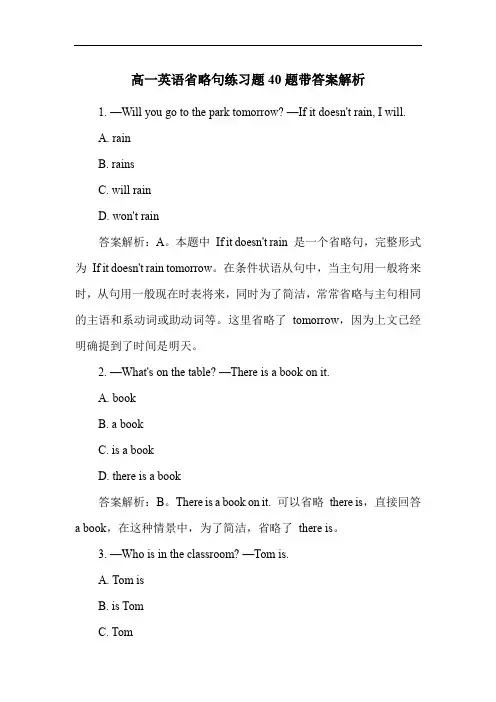
高一英语省略句练习题40题带答案解析1. —Will you go to the park tomorrow? —If it doesn't rain, I will.A. rainB. rainsC. will rainD. won't rain答案解析:A。
本题中If it doesn't rain 是一个省略句,完整形式为If it doesn't rain tomorrow。
在条件状语从句中,当主句用一般将来时,从句用一般现在时表将来,同时为了简洁,常常省略与主句相同的主语和系动词或助动词等。
这里省略了tomorrow,因为上文已经明确提到了时间是明天。
2. —What's on the table? —There is a book on it.A. bookB. a bookC. is a bookD. there is a book答案解析:B。
There is a book on it. 可以省略there is,直接回答a book,在这种情景中,为了简洁,省略了there is。
3. —Who is in the classroom? —Tom is.A. Tom isB. is TomC. TomD. there is Tom答案解析:A。
完整回答是Tom is in the classroom. 为了简洁,省略了in the classroom。
4. —Where is your pen? —It's in my bag.A. in my bagB. is in my bagC. it's in my bagD. there is in my bag答案解析:B。
完整回答是It is in my bag. 省略了主语it 和系动词is 之间的空格,为了更加简洁地表达。
5. —How are you? —Fine, thank you.A. FineB. I am fineC. am fineD. Fine, I am答案解析:B。
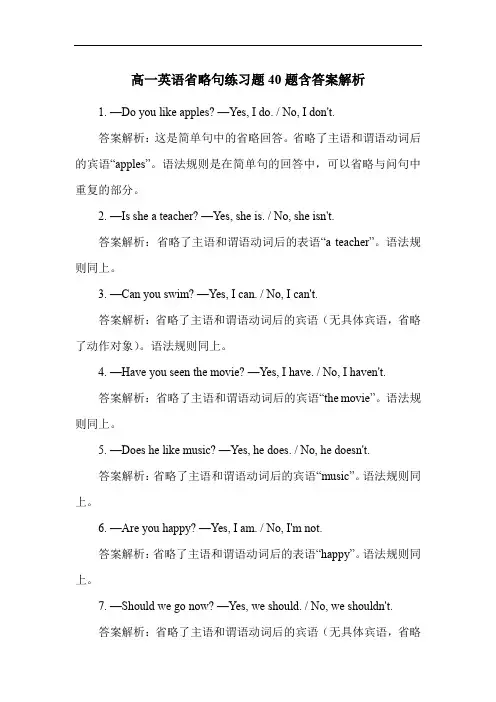
高一英语省略句练习题40题含答案解析1. —Do you like apples? —Yes, I do. / No, I don't.答案解析:这是简单句中的省略回答。
省略了主语和谓语动词后的宾语“apples”。
语法规则是在简单句的回答中,可以省略与问句中重复的部分。
2. —Is she a teacher? —Yes, she is. / No, she isn't.答案解析:省略了主语和谓语动词后的表语“a teacher”。
语法规则同上。
3. —Can you swim? —Yes, I can. / No, I can't.答案解析:省略了主语和谓语动词后的宾语( 无具体宾语,省略了动作对象)。
语法规则同上。
4. —Have you seen the movie? —Yes, I have. / No, I haven't.答案解析:省略了主语和谓语动词后的宾语“the movie”。
语法规则同上。
5. —Does he like music? —Yes, he does. / No, he doesn't.答案解析:省略了主语和谓语动词后的宾语“music”。
语法规则同上。
6. —Are you happy? —Yes, I am. / No, I'm not.答案解析:省略了主语和谓语动词后的表语“happy”。
语法规则同上。
7. —Should we go now? —Yes, we should. / No, we shouldn't.答案解析:省略了主语和谓语动词后的宾语( 无具体宾语,省略了动作对象)。
语法规则同上。
8. —Must I finish the work today? —Yes, you must. / No, you needn't.答案解析:省略了主语和谓语动词后的宾语“the work”和时间状语“today”。
高中英语省略句专练综合专练:1.The boy wanted to ride his bike in the street, but his mother told him _____.A. not toB. not to doC. not do itD. do not to2.The traditional goal of science is to discover how things are, not how they ought ____.A. toB. to beC. beD. have been3.---Did you work in the lab every afternoon---No, but sometimes, I wish I ____.A. had time toB. had time to doC. have time toD. have time4.---I hope the children won’t tou ch the dog.----I’ve warned them ____.A. notB. not toC. not touchD. not do5.Some students are going to China in summer vacation, and ____.A.some are to AmericaB. some going to AmericaC. some to AmericaD. some America6.The workers did all ___ good care of the old man.A. they could to takeB. they could takeC. which they could to takeD. what they could to take7.Of all the things in the world, I think life and love are ____.A.very much preciousB. more than preciousC. the preciousestD. the most precious8.The photographs of other planets taken by satellite are clear than ___.A. the earthB. those taken from the earthC. those of the earthD. of the earth9.why ___ It is not very serious.A. to worryB. worryC. not worryD. you are worried10.___ the road, don’t forget to look both ways.A. As crossingB. While you crossC. While crossingD. Cross11.Chemistry is the science of substances ___ the science of energy.A. and is physicsB. or is physicsC. and physicsD. or physics is12. –Who broke the window--- ____.A. HimB. HeC. He brokeD. It is him13.---Susan, go and join your sister cleaning the yard.--- Why ___ John is sitting there doing nothing.A. himB. heC. ID. me14.---How do you find your missing pen----___.A.Quite by accidentB. I found it in my drawer.C. It writes wellD. It was well kept by myself.15.---You must obey every word of mine.----____ I don’t.A. How ifB. What ifC. Such asD. Only if16.When ___, the museum will be open to the public next year.A. completedB. completingC. being completedD. to be completed17. The man we followed suddenly stopped and looked as if ____ whether he was going in the right direction.A. seeingB. having seenC. to have seenD. to see18.I won’t go to his party next time. It couldn’t have been ____ in fact.A. any betterB. any worseC. so badD. the best19. ---Does Bill do his new job well---_____ his old job. I am afraid there is no hope for him.A. Not better thanB. No better thanC. Not so well asD. Not as well as20.---Leaving for Shanghai---____.A. SoonB. LatelyC. The other dayD. Sooner21.The rent is expensive. I’ve got half the space I had at home and I’m paying ____here.A. as three times muchB. as much three timesC. much as three timesD. three times as much22. —Wait until we get a satisfactory one, will you---I couldn’t agree ___, It sounds good to me.A. muchB. worseC. moreD. at all23. ——I’ll be away on a business tri p. Would you mind looking after my cat——Not at all. ______________.A. I’ve no timeB. I’d rather notC. I’d like itD. I’d be happy to24. ——Let me introduce myself. I’m Albert.——____________.A.What a pleasureB. It’s my pleasureC. P leased to meet youD. I’m very pleased25. ——Do you mind my taking this seat——__________.A. Yes, sit downB. No, of course notC. Yes, take it pleaseD. No, you can’t take it26. ——I usually go there by train.——Why not _____by boat for a changeA. to try goingB. trying to goC. to try and goD. try going27. Unless________ to speak, you should remain silent at the conference.A. invitedB. invitingC. being invitedD. having invited28. Though_______ money, his parents managed to send him to university.A. lackedB. lacking ofC. lackingD. lacked in29. The research is so designed that once _____nothing can be done to change it..A.begins B having begun C. beginning D. begun30. The man we followed suddenly stopped and looked as if________ whether he was going in the rightdirection.A. seeingB. having seenC. to have seenD. to see31. ______, he doesn’t want to go to school and keep in touch with the bad boys.A. As he is a studentB. He is as studentC. Student as he isD. As students he is32. ——The boys are not doing a good job at all, are they——_________.A. I guess not soB. I don’t guessC. I don’t guess soD. I guess not33. In a way, I think we both won: I the game, but cousin Ed my ______.A.friendshipB. respectC. supportD. favor34. — I hate talking with that guy. Look, he is coming. What should I do—Don’t speak until _____.A. speakingB. spoken toC. spokenD. speaking to35. — How are you getting on with your work—Oh, I’m sorry. Things aren’t going so well as _____.A. plansB. planningC. plannedD. to plan36. He is only too ready to help others, seldom, _____, refusing them when they turn to him.A. if neverB. if everC. if notD. if any37. While _____ holding talks with President Hu Jintao, US President George W. Bush thanked China for its important role in the Six-Party Talks.A. he isB. he wasC./D. B or C38. —You should have thanked her before you left.—I meant _____, but when I was leaving I couldn’t find her anywhereA. to thankB. toC. /D. thanking39. When first _____ to the market, these products enjoyed great success.A. introducingB. introducedC. introduceD. being introduced40. I wonder why you won't do it as _____. It's the third time you have done so.A. told toB. be toldC. told youD. you told41. He is rather difficult to make friends with, but his friendship, _____ is more true than anyother.A. once gainedB. when to gainC. after is gainedD. while gaining42. You may take them all home _____.A. if possibleB. if canC. if impossibleD. if you are possible43. Water, _____ enough, can change into vapor quicklyA. when heatedB. while heatingC. when to be heatedD. when is heated44. —Should I look up each word that I don’t understand— No, turn to your dictionary only when _____.A. you are necessaryB. you needC. necessaryD. you are needed45. — You seem to have lost your way. _____— I'm looking for Wangfujing Street.A. What forB. Need helpC. Why soD. Where to高考题链接及能力拓展训练:1. When first ________ to the market, these products enjoyed great success. (NMET 2004全国卷II)A. introducingB. introducedC. introduceD. being introduced2. It shames me to say it, but I told a lie when ________ at the meeting by my boss. (NMET 2004全国卷IV)A. questioningB. having questionedC. questionedD. to be questioned3. The man we followed suddenly stopped and looked as if ________ whether he was going in the right direction. (NMET 2003 安徽春)A. seeingB. having seenC. to have seenD. to see4. Generally speaking, ________ according to the directions, the drug has no side effect. (NMET2003上海卷)A. when takingB. when takenC. when to takeD. when to be taken5. Unless ________ to speak, you should remain silent at the conference. (NMET 2003上海春)A. invitedB. invitingC. being invitedD. having invited6. When ________ , the museum will be open to the public next year. (NMET 2002上海春)A. completedB. completingC. being completedD. to be completed7. Though ________ money, his parents man-aged to send him to university. (NMET 2002上海卷)A. lackedB. lacking ofC. lackingD. lacked in8. The research is so designed that once ________ nothing can be done to change it. (NMET 2002)A. beginsB. having begunC. beginningD. begun9. -You 're always working. Come on, let's go shopping.- ________ you ever want to do is going shopping. (NMET 2002北京、安徽、内蒙古春)A. AnythingB. SomethingC. AllD. That10. Is this the reason ________ at the meeting for his carelessness in his work(NMET 2002上海春)A. he explainedB. what he explainedC. how he explainedD. why he explained11. What surprised me was not what he said but ________ he said it. (NMET 2004湖北卷)A. the wayB. in the way thatC. in the wayD. the way which12. It is easy to do the repair. ________ you need is a hammer and some nails. (NMET 2004天津卷)A. SomethingB. AllC. BothD. Everything13. That's an unpleasant thing to say about your father after ________ he's done for you. (NMET 2004全国卷)A. somethingB. anythingC. allD. that14. As you've never been there before, I'll have someone ________ you the way. (MET 1990上海卷)A. to showB. showC. showingD. showed15. -I'll be away on a business trip. Would you mind looking after my cat-Not at all, ________ . (NMET 1995)A. I have no timeB. I'd rather notC. I'd like itD. I'd be happy to16. -Does your brother intend to study German-Yes, he intends ________ . (NMET 1998上海卷)A. /B. toC. soD. that17. -Would you like to go to the Grand Theatre with me tonight- ________ . (NMET 1999上海卷)A. Yes, I'd like to go to the Grand TheatreB. I'd like to, but I have an exam tomorrowC. No, I won'tD. That's right18. -You should have thanked her before you left.-I meant ________ , but when I was leaving I couldn't find her anywhere. (NMET 2000北京春招卷)A. to doB. toC. doingD. doing to19. ________ it rain tomorrow, we would have to put off the visit to the Yangpu Bridge. (NMET 1994上海卷)A. WereB. ShouldC. WouldD. Will20. ________ for the free tickets, I would not have gone to the films so often. (NMET 1995上海卷)A. If it is notB. WereC. Had it not beenD. If they were not21. I will know what was on his mind at the time, nor will ________ . (NMET 2004 江苏卷)A. anyoneB. anyone elseC. no oneD. no one else22. Of the making of good books there is no end; neither ________ any end to their influence on man's lives. (NMET 2004 广东卷)A. there isB. there areC. is thereD. are there23. -I would never come to this restaurant again. The food is terrible!- ________ . (NMET 2004全国卷III)A. Nor am IB. Neither would IC. Same with meD. So do I。
------------------------------------------------------------ 精选文档 --------------------------------------------------------高中英语省略句莎士比亚以前说过: Brevity is the soul of wit. (言以简为贵)。
为了使话说得简洁简要,英语句子中某个单词、短语甚至从句或主句都能够省去。
这种省去句子某些成分而保持句子意思不变的现象,称为省略( ellipsis )。
一、省略的目的省略常见于非正式的文体,特别在对话中,省略是一种十分广泛的现象。
英语中的省略一般说来有三个目的:A .防止重复,减少负担。
省略的主要目的是防止重复,去掉不用要的负担和繁琐。
Mike said that he would come to school to see me the next day, but he didn't come to school tosee me the next day. 迈克说他第二天要来学校看我,但是次日他并无来学校看我。
-- Mike said that he would come to school to see me the next day, but he didn't.迈克说他次日要来学校看我,但是他并无来。
(免却最后九个词,句子简短多了)— What did he want yesterday他昨天要了什么?— An apple.一个苹果。
(假如回答时说出全文“ He wanted an apple yesterday,便显得”别扭,不自然)B .连结密切,构造紧凑。
省略也是使上下文密切连结的一种修辞手段。
John was the winner in 1994 and Bob in 1998. 约翰是 1994 年的获胜者,鲍勃是 1998 年的获胜者。
高一英语省略句运用实例练习题30题1. —Where is your father? —He is in the office. He is busy with his work.(改为省略句)—Where is your father? —In the office. Busy with his work.答案:省略了“He is”。
因为上文已经提到“He is in the office”和“He is busy with his work”,为了避免重复,可以省略相同的部分。
这里遵循了省略句中为避免重复而省略相同内容的语法规则。
2. —What are you doing? —I am reading a book.(改为省略句)—What are you doing? —Reading a book.答案:省略了“I am”。
理由同上,为避免重复而省略相同部分。
这是省略句中常见的一种情况,当句子的主语和谓语与上文相同时,可以省略。
3. —Are you going to the library? —Yes, I am.(改为省略句)—Going to the library? —Yes.答案:省略了“Are you”和“I am”。
当询问的句子比较简单,且回答也比较简短时,可以进行这样的省略。
这种省略在日常交流中很常见,符合简洁表达的习惯。
4. —How are you? —Fine, thank you.(改为省略句)—How are you? —Fine.答案:省略了“thank you”。
在日常交流中,当回答“How are you?”时,如果只回答“Fine.”,对方也能明白意思,所以可以省略“thank you”。
5. —Do you like apples? —Yes, I do.(改为省略句)—Like apples? —Yes.答案:省略了“Do you”和“I do”。
2024年高中英语状语从句省略现象单选题20题1. When ____ in the library, students should keep quiet.A.readingB.to readC.readD.having read答案:A。
本题考查时间状语从句的省略。
完整的句子是When students are reading in the library,students should keep quiet。
当主句和从句的主语一致,且从句中有be 动词时,可以省略从句的主语和be 动词。
选项A 符合省略后的形式。
选项B 是不定式,表示目的或将来,不符合语境。
选项C 是动词原形,不能单独作状语。
选项D 是现在分词的完成式,表示动作先于主句发生,也不符合语境。
2. If ____ possible, I will go to the concert with you.A.isB.wasC.beingD.it is答案:D。
本题考查条件状语从句的省略。
完整的句子是If it is possible,I will go to the concert with you。
当条件状语从句中含有it is/was 时,可以省略it is/was。
选项D 是完整形式。
选项A 和B 缺少主语it。
选项C 是现在分词,不符合条件状语从句的省略规则。
3. While ____ TV, I heard a loud noise outside.A.watchingB.to watchC.watchedD.have watched答案:A。
本题考查时间状语从句的省略。
完整的句子是While I was watching TV,I heard a loud noise outside。
当主句和从句的主语一致,且从句中有be 动词时,可以省略从句的主语和be 动词。
选项 A 符合省略后的形式。
选项B 是不定式,表示目的或将来,不符合语境。
高中英语省略句莎士比亚曾经说过:Brevity is the soul of wit. (言以简为贵)。
为了使话说得简明扼要,英语句子中某个单词、短语甚至从句或主句都可以省去。
这种省去句子某些成分而保持句子意思不变的现象,称为省略(ellipsis)。
一、省略的目的省略多见于非正式的文体,尤其在对话中,省略是一种十分普遍的现象。
英语中的省略一般说来有三个目的:A.避免重复,减少累赘。
省略的主要目的是避免重复,去掉不必要的累赘和繁琐。
Mike said that he would come to school to see me the next day, but he didn't come to school to see me the next day. 迈克说他第二天要来学校看我,但是第二天他并没有来学校看我。
-- Mike said that he would come to school to see me the next day, but he didn't. 迈克说他第二天要来学校看我,但是他并没有来。
(省掉最后九个词,句子简洁多了)— What did he want yesterday 他昨天要了什么?— An apple. 一个苹果。
(如果回答时说出全文“He wanted an apple yesterday”,便显得别扭,不自然)B.连接紧密,结构紧凑。
省略也是使上下文紧密连接的一种修辞手段。
John was the winner in 1994 and Bob in 1998. 约翰是1994年的获胜者,鲍勃是1998年的获胜者。
(Bob后省略了was the winner,句子结构显得比较紧凑)In some places we stopped in tents for the night, in other places in caves. 我们在有些地方住在帐篷里过夜,在有些地方住在山洞里。
(in other places 后省略了主语和谓语we stopped for the night,上下文连接更加紧密)省略:回答问题要简洁,并列重复需省略。
祈使主语常省略,比较than后需省略。
宾从表从that 勿省略。
前后出现同一词,习惯表达需省略。
C.强调重点,突出信息。
省略的另一作用是突出新的信息。
Truth speaks too low, hypocrisy too loud. 真理讲话声太低,虚伪讲话声太高。
(后一分句省略谓语speaks,突出了too loud)— Have you told him that 你把那告诉他了吗?— Not yet. 还没有呢。
(= I have not told him that yet. 强调not yet )二、可省略的成分省略大致可归纳为功能词的省略和语法结构上的省略两种。
在很多情况下,这两种省略存在着交*的关系,即有时既是功能词的省略,同时又是语法结构上的省略。
A.功能词的省略功能词指的是没有完整意义,但有语法意义的词,如冠词、介词、助动词等。
英语句子结构的简洁,首先表现在功能词的省略上。
1.冠词的省略They elected John (the) monitor of the class. 他们选约翰当班长。
A man and (a) woman are talking in the office. 办公室一男一女正在谈话。
He could not understand why there was no noise coming from the house, not even the sound of the radio or (the) television. 他不明白为什么从屋子里一点响声也没传出来,甚至连收音机和电视机的声音也没有。
提示:在英语新闻标题、告示中,经常省略冠词。
Chinese President Stresses Role of Working Class 中国国家主席强调工人阶级作用(新闻标题= The Chinese President Stresses the Role of the Working Class)People Rebuild Homes After Flood 洪水退后人民重建家园(新闻标题= The People Rebuild Their Homes After the Flood)DO NOT SPEAK TO DRIVER WHILE BUS IS IN MOTION 汽车在行驶时请勿和司机讲话。
(告示= Do not speak to the driver while the bus is in motion)2.代词的省略I went to the market, (I) bought something useful, and (I) returned home within an hour. 我去了市场,买了点有用的东西,一小时之内就回来了。
They didn't like it, yet (they) said nothing. 他们并不喜欢它,可是什么话也没说。
(It) Doesn't matter. 这不碍事。
(You) Had a good time, didn't you 玩得开心,是吧?I like your two small bottles, but I don't like the smallest (one). 我喜欢你的两只小瓶子,但我不喜欢最小的那一只。
3.连词的省略We are delighted (that) you can come. 你能来,我们很高兴。
I believe (that) you will succeed.我相信你们会成功的。
It's a pity (that) he's leaving. 他要走,真遗憾。
4.关系词的省略I'll give you all (that) I have. 我要把我所有的一切都给你。
He read the book (which) I got yesterday. 他看过我昨天买的书了。
It wasn't I (who) let him in. 不是我放他进来的。
It happened on the day (when) we first met. 这发生在我们初次见面的那一天。
There is a man (who) wants to see you. 有个人想要见你。
5.助动词的省略(Does) Anyone want a drink 有谁要喝一杯吗?Who (do) you think you are 你以为你是谁?(在特殊疑问句中,当主语是第二人称时,助动词do可省略)I (have) got to go now. 我得走了。
6.不定式符号的省略I hope to finish my job and (to) go back home. 我希望做完事回家。
(当几个不定式并列时,一般只需在第一个不定式前用to)What we could do was (to) get away. (主语从句中含有do,那么作表语的动词不定式往往省略to)We did not dare (to) speak. 我们不敢说话。
(dare作行为动词用时,否定式可省略to)There is nothing to do but (to) obey the orders. 除了服从命令之外,我们别无他法。
(介词but 前如有do,but后可省略to)注意:当两个并列的不定式在意义上表示对比关系时,后面的不定式一般不省略to。
To be or not to be, that is the question. 活着还是死亡,这就是问题所在。
(莎士比亚)It was better to laugh than to cry. 笑比哭好。
7.介词的省略He went (in) that way. 他往那边去了。
The two boys are (of) the same age. 这两个男孩年龄一样大。
I am in doubt (about) whether this is right or not. 我拿不定主意这对不对。
You may come to see me (at) any time between 4 and 5. 你在4点到5点之间随时都可以来见我。
She must have stayed here (for) a long time. 她在这里一定呆了很久了。
必背:在下列结构中,介词in常常省略。
be busy (in) doing sth. 忙于做某事spend time (in) doing sth. 花时间做某事waste energy (in) doing sth. 浪费精力做某事have difficulty (in) doing sth. 做某事有困难have a good time (in) doing sth. 某事做得非常愉快have a hard time (in) doing sth. 某事做得很艰难take turns (in) doing sth. 轮流做某事It is no use (in) doing sth. 做某事没有用It is no good (in) doing sth. 做某事无益There is no hurry (in) doing sth. 不必着急做某事There is no point (in) doing sth. 做某事无意义There is no use (in) doing sth. 做某事没有用8.引导词there的省略(There) Ought to be some coffee in the pot. 壶里应该有些咖啡的。
(There) Must be somebody waiting for you. 肯定有人在等你。
B.句子成分的省略为了避免重复,或者为了使某一内容显要注目,可以省略某些句子成分而保持句子原意不变。
1.省略主语Hope so. 希望如此。
(= I hope so.)Beg your pardon. 请你原谅。
(= I beg your pardon.)Take care! 当心!(= You take care.)Looks as if it will rain. 看起来像要下雨。
(= It looks as if it will rain.)Serves you right. 你活该!(= It serves you right.)注意:祈使句主语通常省略(如Take care! 当心!)。